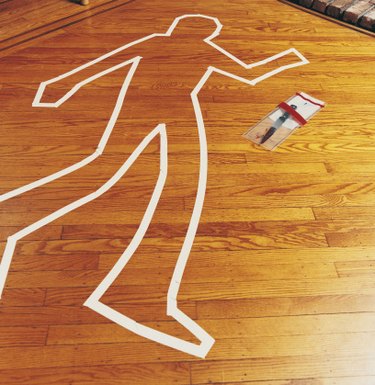
A crime scene scavenger hunt is a fun group activity for a family or a small gathering of friends. Your guests get to solve crimes, discover motives from witnesses or compete to determine which guests should have gone into police work. Make sure your clues follow a specific story and will successfully lead your guests to the right answer because the fun is in solving your crimes.
The Motive Game
Video of the Day
Select specific roles for your game where some guests play witnesses and a few play the roles of police. Hand an envelope to each witness that includes a short description of what they saw and their personal motive for having committed the crime. Their goal will be to protect their own potential involvement while pointing the finger at other witnesses. Within the scene, place clues to each of the witness's motives and have your guests keep lists of all of the clues that they find. The game is to collect those clues, building their lists and then determining which witness each clue points to. Stage large conversations between your police officers and all of the witnesses together after the discovery of each major new piece of evidence and let your guests act out their roles and try to turn the evidence against each other.
Video of the Day
Three in One
A crime scene can tell multiple stories at once. Create yours with three specific stories worth of evidence. The first story is the murder upon which your guests should focus. The second is the crime of which your victim was guilty. The third is your red herring story. As your guests search through your crime scene, they must look for these clues and then determine which storyline each clue is a part of. They may find a box of matches with a mysterious phone number inside, a pair of muddy tennis shoes and a well cleaned knife. It will be for them to determine that the well cleaned knife must be the victim's, the matches were just something that the victim picked up a few nights ago and that the shoes must be the property of the real killer. Have your guests hunt for all of the potential clues within your crime scene, write a list of the clues they locate and then place those clues into the three specific categories
Missing Clues
Not every crime scene is a complete crime scene. Prepare a list of additional clues to help your guests understand the crime scene, such as witness statements. Instruct your guests to each write the clues that they discover on a piece of paper. Once they collect some of the clues from your original crime scene, allow them to hear your additional clues, one by one. The guest who first solves the crime wins.
Motive, Method, Opportunity
Solving crimes requires looking for specific clues involving motive, method and opportunity. Give your guests a piece of paper with three empty columns entitled motive, method and opportunity. Then let them explore a crime scene that you have carefully prepared with a collection of evidence for each of these requirements. Have your guests collect the clues, then write their final list, with all the clues listed under the three sections. You keep the master list so you can check their discoveries later. Make sure the clues tell a story about their element of the crime. When everyone is done, figure out whose list is most accurate to determine a winner and then demonstrate the crime so they can see how it really happened.